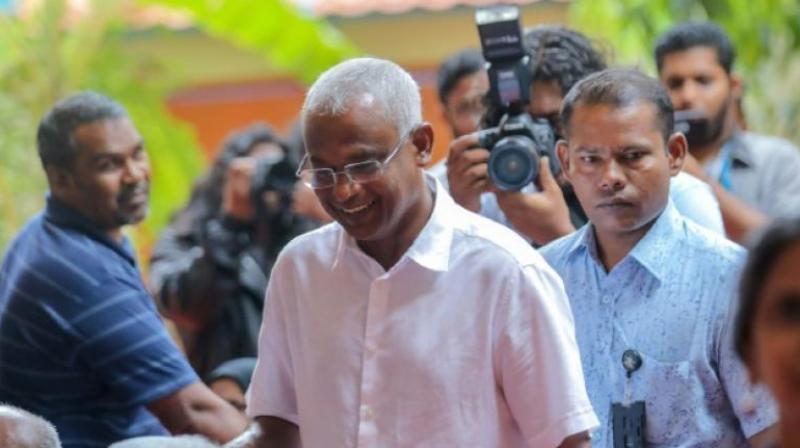Change in Maldives: India must do its bit

India was one of the first countries to congratulate Ibrahim “Ibu” Mohammed Solih for his victory in Sunday’s epic presidential elections in the Maldives, even before the Election Commission had officially declared the results, underscoring the importance that the tiny Indian Ocean nation holds for New Delhi.
The turnout as officially announced by the Maldives election body tells it own story. Not only did 89.2 per cent of Maldivians vote, reflecting the people’s overwhelming desire for change, the EC’s results showed Mr Solih garnered 134,616 votes to Abdulla Yameen’s 96,132 votes, an unassailable margin of some 38,484 votes, with the EC forced to extend voting by four hours because of the turnout.
The incoming President, a joint Opposition candidate, was backed by two former Presidents, one in exile, the other in jail and an influential third force in the Jamhury Party, reflecting the high stakes the Opposition parties had in removing the incumbent, who had steadily subverted every institution from the election body itself to the judiciary and police, ruling through fiat, fear and intimidation.
The outgoing President conceded defeat, saying he accepted the “people’s decision”. But until he formally met Mr Solih, and promised a smooth handover by mid-November, when he demits office, few believed that the election wouldn’t be stolen from under the Opposition’s nose and returned to the one-party-one-man rule that was the norm until Mohammed Nasheed and his Maldivian Democratic Party won the first free polls of 2008. Most observers expected Mr Yameen to reimpose his writ on the island nation by conjuring up fresh coup threats and mobilising the Army, which had on his orders stormed the Supreme Court in February to hold off on his impeachment. However, faced with the crushing turn of Sunday’s polls, the Army stayed neutral, which is exactly what former President Nasheed’s MDP, fronted by Mr Solih, hoped for. But November 17 is still eight weeks away, and the challenge before Mr Solih in the coming months will be to ensure all government institutions revert to their pre-Yameen impartiality, with Mr Solih himself impressing on the need for a return to true democracy.
The challenge ahead for the incoming administration, once in office, will be to navigate the India-China shoals and counterbalance the two Asian rivals. Mr Yameen has virtually locked his nation into China’s suffocating grip, with the potential for Male to renege on debt servicing of the million-dollar newly renamed Sinamale bridge project extremely high. China must wonder whether the Maldives will take the Malaysia route, and like President Mahathir Mohamed scrap joint projects.
For India, it is imperative to make up for lost time, and capitalise on these election results as the first step in re-integrating the Maldives back into its strategic sphere, but in a partnership of equals.

